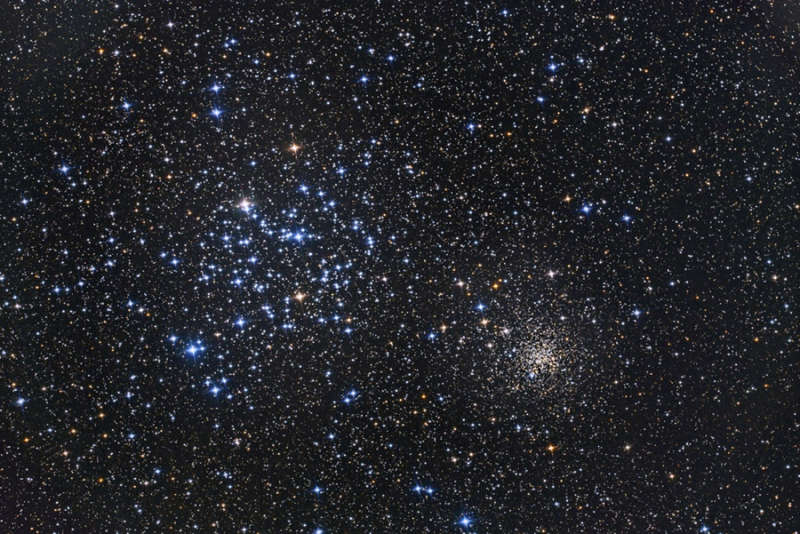Credit & Copyright: Dieter Willasch
(Astro-Cabinet)
Explanation:
Open clusters of stars can be near or far, young or old,
and diffuse or compact.
Found near the plane
of our Milky Way galaxy, they
contain from 100 to 10,000 stars, all of which formed at
nearly the same time.
Bright blue stars frequently
distinguish younger open clusters.
M35,
on the upper left, is relatively nearby at 2800
light years distant, relatively young at 150 million years old,
and relatively diffuse, with about 2500 stars spread out over a
volume 30 light years across.
An older and more compact open cluster,
NGC 2158,
is at the lower right.
NGC 2158 is four times
more distant than
M35,
over 10 times older, and much more compact with many
more stars in roughly the same volume of space.
NGC 2158's bright blue stars have
self-destructed,
leaving cluster light to be dominated by
older and yellower stars.
Both
clusters are seen toward the constellation of
Gemini.
APOD Editors to Speak:
RJN in
Philadelphia on Jan. 3 &
JTB in New York City on Jan.
4
1999 2000 2001 2002 2003 2004 2005 2006 2007 2008 2009 2010 2011 2012 2013 2014 2015 2016 2017 2018 2019 2020 2021 2022 2023 2024 2025 |
Yanvar' Fevral' Mart Aprel' Mai Iyun' Iyul' Avgust Sentyabr' Oktyabr' Noyabr' Dekabr' |
NASA Web Site Statements, Warnings, and Disclaimers
NASA Official: Jay Norris. Specific rights apply.
A service of: LHEA at NASA / GSFC
& Michigan Tech. U.
|
Publikacii s klyuchevymi slovami:
M 35 - NGC 2158 - open cluster - Rasseyannoe skoplenie
Publikacii so slovami: M 35 - NGC 2158 - open cluster - Rasseyannoe skoplenie | |
Sm. takzhe:
Vse publikacii na tu zhe temu >> | |
